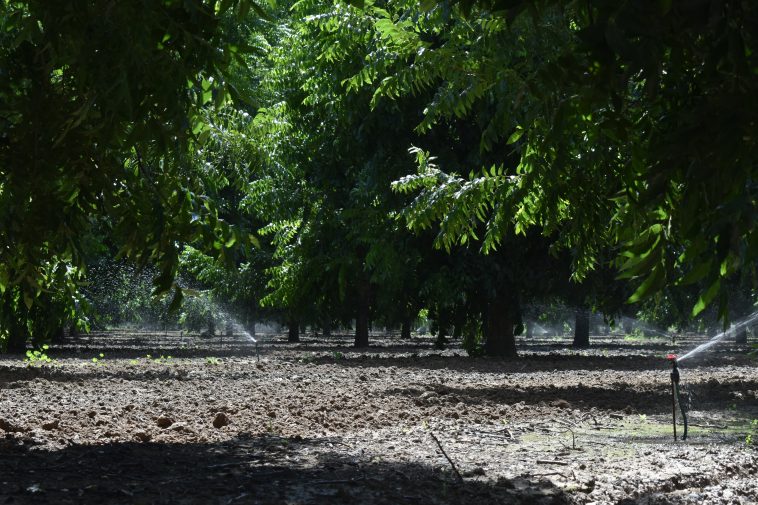To meet the water requirements of pecan nut trees for commercial production in South Africa, rainfall is not enough. That is why smart irrigation solutions are necessary during the critical growth phases to ensure optimal yield and quality.
Heinrich Weideman has been farming with pecans since 1994 in the Perdeberg district near Kimberley. His farm, Patrysvlei Pecans, is one of the oldest pecan orchards in the Northern Cape. Their relationship with Agrico started even earlier. Heinrich was a vegetable and grain farmer before he invested in pecans. It was during those years that his path crossed with Agrico.
“In 1988, we set up centre pivots. I was impressed with Agrico’s products, expertise and service. That is why it was natural to approach Agrico for the next irrigation solution.”
The perfect area for pecan production
They decided to switch to nuts because it can be marketed as an export product, and the process can be mechanised. Patrysvlei Pecans’ nuts are mainly grown for the export market, specifically China. Exportation is made possible by SA Pecans.
“In the beginning there was little information available. We consulted Prof Holzhausen at the ARC (Agricultural Research Council). He mapped South Africa and classified it into areas A, B and C in terms of suitability for pecan cultivation. We saw that we fell into an A+ category.”
The area’s high summer temperatures and cold winters provide a rest period for the tree. Without enough rest, quality and the yield decrease. There is also lower humidity which lowers the risk of disease. To track down the right cultivars, Heinrich relied on the expertise of America’s fourth-generation pecan farmers. He initially planted several cultivars, but Wichita and Western Schley proved most successful in the Northern Cape.

Since 1994, the team at Agrico Kimberley has been working closely with Patrysvlei Pecans. The men smiling so contentedly are (from left to right) Freddie Craigie and Joe Coetzee from Agrico, with Heinrich Weideman, farmer of Patrysvlei Pecans, and his son-in-law, Dirkie Calitz, who also works on the farm.
From flood irrigation to macro irrigation with Agrico
Initially, Heinrich used flood irrigation to water the trees. However, managing the irrigation application, water evaporation and scheduling, proved to be a challenge. Freddie Craigie, irrigation marketer at Agrico, has been part of the Kimberley team since 2003. Since 2010, he managed irrigation for farmers in this district. He was responsible for converting Heinrich’s flood irrigation system to macro-irrigation. Where crops such as pecan trees require more water than micro-irrigation can provide, but other systems apply too much water, macro-systems are ideal. With macro-irrigation, the entire surface is sprayed and it uses significantly less water.
“We irrigate 220 hectares of pecan orchards with trees planted 10 by 10 meters apart,” Heinrich explains. A pecan tree needs approximately 1 200 ℓ of water per season. The American farmers recommended that the system should be able to apply 400 ℓ per tree per day, but Heinrich’s system can apply up to 1 300 ℓ per tree per day for peak season irrigation. When he irrigates in these months from December to mid-February, the system uses 270 to 290 ℓ/h per tree. In winter, the trees rarely need water.
Macro-irrigation from Agrico faithfully irrigates nuts
Heinrich knows how important it is for a service provider to understand that agriculture does not have office hours. “I can call Freddie any time when I need him, and he can help me right away,” he says. “Agrico helps us with the expertise and the technology they offer.”
Freddie explains that an irrigation system must be designed in close collaboration with the farmer to ensure that the needs of the farmer and orchard are understood. After the plans are finalised, the layout is done and construction under Freddie’s expert guidance follows.
“We are involved in the entire process – from design to the moment when the excited farmer opens the taps for the first time. Even after that, we are always available to help.”
Sorting plant for Patrysvlei Pecans
Patrysvlei Pecans also recently set up a sorting plant. “We wanted to set up a cracking plant back in 1998, but there wasn’t enough volume to justify the investment. Instead, we shifted our focus to improved nut grading. This process assures our buyers that the size, quality and uniformity of nuts are consistent,” he says.
“Now we also provide this service to other producers.” In the plant, nuts are classified according to size, i.e., small, medium, large and extra-large. Nuts that are poorly filled are then removed using a vacuum process. Finally, the nuts are bagged and the cargo is prepared for shipment.
To locate your nearest Agrico branch, visit the website at www.agrico.co.za .










[…] Read how AGRICO macro-irrigation improves water management for pecan nuts. […]